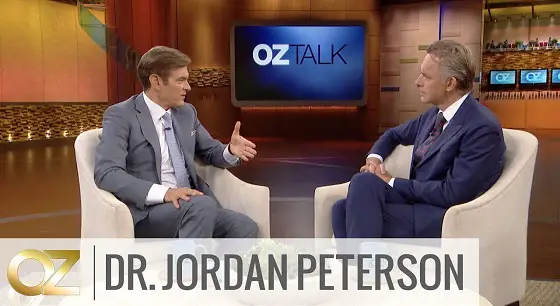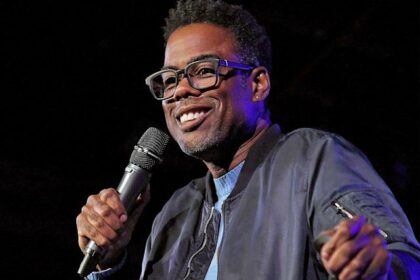Dr. Oz had a guest on his show by the name of Dr. Jordan Peterson. Dr. Peterson is a clinical psychologist and professor at the University of Toronto. He has been gaining a lot of headlines lately for his messages for humanity along with his best-selling book 12 Rules For Life: An Antidote To Chaos which can be bought on Amazon here. Many people such as Joe Rogan, Tim Ferriss, Patrick Bet David, Tom Bilyeu, Bill Maher and Dr. Oz have had Dr. Peterson on their shows as guests.
Dr. Oz had Dr. Peterson on his show and the first question he asked him was “So it is an interesting group of insights that you offer us. Let me just start with what is it that you’re saying that’s resonating with so many people? What itch are you scratching?”
To which Dr. Peterson responds “I think there’s probably two. We’ve had a long conversation in our culture about the necessity for self-esteem and happiness and that’s not what I’m talking about. I tell my audiences and my readers very straightforwardly that life is very difficult and there’s a lot of suffering in it. You have to learn how to conduct yourself in the face of that. The problem with the pursuit of happiness is that when life’s storms come along happiness disappears. Then you’re left with nothing. So you have to pursue something that’s deeper than happiness.
“If happiness comes along then hooray for you. You don’t want to despise it because it’s fleeting. But it’s much better to pursue things that are meaningful than things that make you happy. It’s deeper and it orients you more appropriately and it keeps you centered in your own life. It makes you more valuable for you and your community.”
He continues “It’s a relief for young people to know that the baseline conditions of life are difficult but that you can still prevail. It’s a funny message because on one hand its somewhat pessimistic. Now I talk about suffering and malevolence also. I also emphasize that despite that being the base conditions of existence people are tough enough to prevail. That’s one element of it.”
“The other element is the necessity of responsibility. A lot of what people find in life provides them with sustaining meaning is a consequence of not the pursuit of rights or the pursuit of happiness or the development of self-esteem but the adoption of responsibility and the more responsibility in some sense the better. Responsibility for yourself to make sure that your life lays itself out like it should. Responsibility for your family. Responsibility for the community. It’s people who take responsibility are the are the ones that you admire. That’s the right pathway through life. That’s where meaning is to be found. I think that’s probably the crucial issue is that identification of a profound relationship between responsibility and meaning.”
Dr. Peterson continues “And for many of the people that I’m talking with it seems like that that’s the first time that this has been articulated for them.”
Dr. Oz “So speaking about responsibility and meaning and how to make sense of a world where so many people feel isolated. I’ll come back to that. That seems so helpful. Yet, you’ve been a lightning rod in many ways with a lot of harsh comments from the media, especially the print media.
Peterson “Well, I got embroiled in a political dispute I would say in my home front, in Canada when our Government introduced some legislation that purported to be about compassion, which to my way of thinking was about compulsion with regards to speech. And so that’s tangled me up. But I also think that people aren’t necessarily that happy with a message of personal responsibility when they’re really interested in the mechanics of social change.”
Peterson continues.. “My sense is that, well, life is unfair. Social structures are unfair. The arbitrary way that illness is distributed into the population is unfair. But, despite that, the best level of analysis for rectifying that in a practical sense but also in the psychological sense is the level of the individual, and so people who think in a collectivist manner or people who are playing identity politics games that insist that your group identity should be your hallmark don’t like what I have to say at all.”
Dr. Peterson continues “And they have their reasons. I’m not a fan of identity politics types. I think it’s a very very dangerous game. Particularly because it makes us tribal, and tribal people are very dangerous. Now, as we degenerated into our tribal groups the probability of violence increases as far as I’m concerned. That’s what the anthropological data would suggest as well. So, the collectivist types don’t like me very much.
Dr Oz “Clinical psychology, it’s a challenging profession. You chose it coming out of a rural town in Central Canada. How did that advance your life journey? What in your life has inspired you to do what you do now? Especially to take some of the public steps now that are drawing criticism to you which is always painful.”
Dr. Peterson “Well, I’ve always been obsessed with totalitarianism. Authoritarian governments whether they’re on the right or the left. For years, decades really. I spent almost all of my free time thinking about what happened in Nazi Germany and what happened in Russia. During the soviet era, but also in Mao, China. There were other places as well. Trying to understand how we got off the rails so absolutely terribly. I started studying that at the collectivist level. Looking for political reasons or economic reasons. But as I investigated deeper those levels of analysis became increasingly, they weren’t providing the answers that I wanted. I think partly because I was really interested in the notion that there’s something to learn from what say happened in Nazi Germany. But there’s something to learn at an individual level. I don’t think that there were innocent masses of people led astray by a single malevolent leader. I don’t think the fundamental motivations for what happened in Nazi Germany were economic.”
Jordan continues “I don’t think they were in the Soviet Union either as I read more and more about the situation. I realized that the proclivity of individuals to avoid responsibility and to lie, especially about their own lives and about their own experience were really the reasons that those systems went so far astray. Now, there were other reasons as well. But those were very important to me because I also thought the proper lesson in the aftermath of something like auschwitz was how do I ensure that I live a life such that if I was offered the opportunity to do something terrible by omission or by commission that I wouldn’t do it? That I would have enough strength of character to resist.
Peterson continues “So, the lessons there for me were psychological. That taught me an awful lot about the role of the individual. People like Victor Frankel for example who wrote ‘Man’s Search For Meaning’ which is a perennial classic and a great book. He insisted that part of the reason that Germany went off the rails so badly was that German citizens were so willing to falsify their own experience. Alexander Gosanich who wrote the Gulag Archipeligo, the best document on what happened in the Soviet Union also made exactly the same argument. So I got psychologically interested in the psychological causes of catastrophic Governance lets say, and that taught me a lot. It taught me a lot about responsibility. About responsibility of the sovereign individual.
“And you know, we have an idea in our culture. It’s a very powerful idea that each of us is of intrinsic value. But, that associated with that value is a responsibility. We have a responsibility lets say, for our own integrity and for that of our families but also of the state. Because otherwise we wouldn’t have the sovereign responsibility and right to vote. Our whole culture is predicated on the idea that each of us are sufficiently significant. So that we can entrust the destiny of the state itself to our decisions. It’s like, well, I believe that and I think that that’s a correct idea. Which is why I think systems based on that idea function so well like our western systems do. But that’s a responsibility that has to be taken with dead-seriousness because it means that the good things you do in your life are truly good and they matter. They ripple outward, way more than you think. But so are the things you do that aren’t good including the acts of deception that you engage in. Perhaps, above all else. Which would include your willingness to evade responsibility. To push it off to someone else, or to play the short-term against the long-term.”
Watch The Full Dr. Jordan Peterson Interview With Dr. Oz Here:
You can pickup Dr. Jordan Peterson’s new book “12 Rules For Life: An Antidote To Chaos” On Amazon By Clicking Here.





